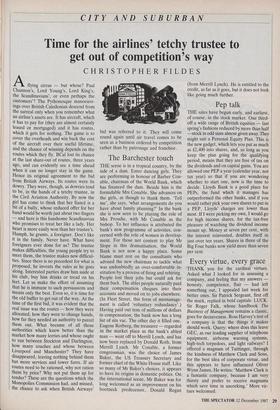The Barchester touch
THE scene is in a tropical country, by the side of a dam. Enter dancing girls. They are performing in honour of Barber Con- able, chairman of the World Bank, which has financed the dam. Beside him is the formidable Mrs Conable. She advances on the girls, as though to thank them. 'Tell me', she says, 'what arrangements do you have about family planning?' In the bank she is now seen to be playing the role of Mrs Proudie, with Mr Conable as the bishop. To her influence is attributed the bank's new programme of activities, con- cerned with the role of women in develop- ment. For those not content to play Mr Slope in this dramatisation, the World Bank is not now a happy place. Some blame must rest on the consultants who advised the new chairman to tackle what was undoubtedly an over-comfortable in- stitution by a process of firing and rehiring. People lost their jobs but could ask for them back. The abler people naturally paid their compensation cheques into their accounts and moved on to jobs elsewhere. (In Fleet Street, this form of mismanage- ment is called 'voluntary redundancy'.) Having paid out tens of millions of dollars in compensation, the bank now has a long list of sits vac. The other day it filled one. Eugene Rotberg, the treasurer — regarded in the market place as the bank's ablest man — went off to Merrill Lynch, and has now been replaced by Donald Roth, from Merrill Lynch. Mr Conable, a former congressman, was the choice of James Baker, the US Treasury Secretary and former chief of the White House staff. Like so many of Mr Baker's choices, it appears to have its origins in domestic politics. On the international scene, Mr Baker was for long welcomed as an improvement on his bootneck predecessor, Donald Regan (from Merrill Lynch). He is entitled to the credit, as far as it goes, but it does not look like going much further.


























































 Previous page
Previous page